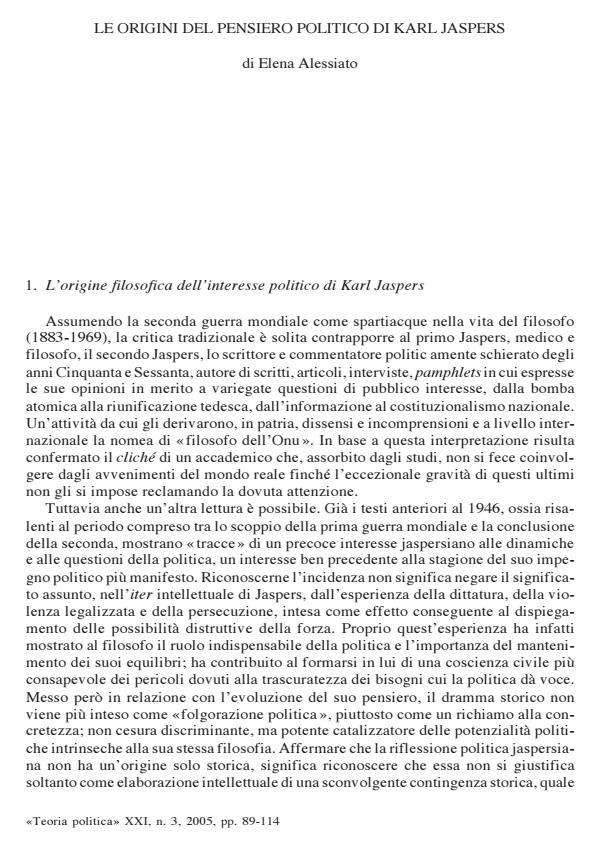Le origini del pensiero politico di Karl Jaspers
Titolo Rivista TEORIA POLITICA
Autori/Curatori Elena Alessiato
Anno di pubblicazione 2005 Fascicolo 2005/3
Lingua Italiano Numero pagine 26 P. Dimensione file 516 KB
DOI
Il DOI è il codice a barre della proprietà intellettuale: per saperne di più
clicca qui
Qui sotto puoi vedere in anteprima la prima pagina di questo articolo.
Se questo articolo ti interessa, lo puoi acquistare (e scaricare in formato pdf) seguendo le facili indicazioni per acquistare il download credit. Acquista Download Credits per scaricare questo Articolo in formato PDF

FrancoAngeli è membro della Publishers International Linking Association, Inc (PILA), associazione indipendente e non profit per facilitare (attraverso i servizi tecnologici implementati da CrossRef.org) l’accesso degli studiosi ai contenuti digitali nelle pubblicazioni professionali e scientifiche.
The traditional philosophical historiography is used to present Karl Jaspers as an «apolitical» scholar with no sense of reality until 1945. Against this image the following paper explains Jaspers’ political thought under the sign of continuity and states that Jaspers’ interest in politics has its deepest origin in the peculiar Jaspers’ idea of philosophy. From the persuasion that philosophy has to be a Lebenspraxis addressed to fulfil the requirement of freedom and dignity that the human nature sets forward, it follows that the relationship between philosophy and politics is necessary and mutual: «There is no great philosophy without political thought». Without overlooking the deep difference between Jaspers’ political meditation before 1933 and the one after 1945, the following essay shows that Jaspers’ interest in politics dates back to the time of the First World War. In 1917 Karl Jaspers gave a lecture at a meeting of a political club, of which he was member, formed in Heidelberg during the First World War: Politische Stimmungen. This is the first Jaspers’ political writing, remained nearly unknown until it was transcribed and published for the first time in 1999 in Germany. The heavy influence of Max Weber is clearly recognizable both in the use of ideal type system and in Jaspers’ approach to political world, that is possible to call as realistic. The same approach appears in the essay Die geistige Situation der Zeit (1931). But the intellectual categories of the Existenzphilosphie and in particular the ontological antinomy between Dasein and Existenz taint Jaspers’ political analysis and prevent it from being efficacious and persuasive. The realistic paradigm still remains abstract and unable to make out the concrete happenings and dangers of reality. The Second World War and the horror of National Socialist dictatorship will bring to full maturity the philosophical attitude showed by Karl Jaspers toward the human being and all the aspects of his existence, from medicine up to politics.
Elena Alessiato, Le origini del pensiero politico di Karl Jaspers in "TEORIA POLITICA" 3/2005, pp , DOI: